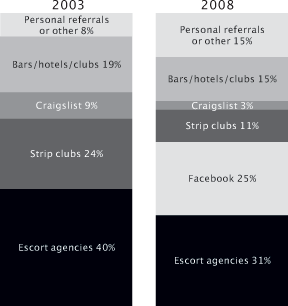Survey: 83% of Prostitutes Use Facebook Pages to Attract Customers
 In a multi-year survey of 270 New York sex workers, Wired has determined that 83% of the prostitutes involved have a Facebook page and actively use it for recruiting customers. Compared to 2003, Facebook has exploded in the sex marketplace, taking a substantial bite out of other venues — such as escort agencies, strip clubs, and Craigslist.
In a multi-year survey of 270 New York sex workers, Wired has determined that 83% of the prostitutes involved have a Facebook page and actively use it for recruiting customers. Compared to 2003, Facebook has exploded in the sex marketplace, taking a substantial bite out of other venues — such as escort agencies, strip clubs, and Craigslist.

The above graph, from Wired’s article, shows the sources of sex workers’ regular clients. What’s surprising is the rapid adoption of Facebook, which launched in 2003 but was not opened to the public until 2006. That means that in just two years, Facebook has claimed 25% of the traffic.
Also remarkable is that while sex workers were using Craigslist prior to Facebook, its use was limited and has almost completely vanished as a source. One likely theory is that Facebook has a more positive image, making customers feel safer. Also, it is less anonymous than Craigslist, giving sex workers some leverage over their clients. This may be bolstered by Wired’s observation that sex workers prefer BlackBerrys, since it gives them a professional, almost business-like appearance — perhaps the same sense provided by Facebook.
The near 50% reduction of strip club traffic and 10% reduction from escort agencies may indicate that sex workers are moving more and more from a face-to-face industry, to one with little actual personal contact in the negotiation process.
Currently, Facebook’s terms of use do not explicitly ban the solicitation of sex, though there is a blanket ban on unlawful activity, and prostitution is currently illegal in every U.S. state except Nevada. From the terms of use:
You will not use Facebook to do anything unlawful, misleading, malicious, or discriminatory.
Craigslist, conversely, has famously removed the adult services listing from its site, creating something of a defacto ban on using the website for prostitution. How or if Facebook responds to this new data will be especially interesting to industry observers.
Though interesting, the results from Wired are problematic. Firstly they represent the responses of only 270 participants, compared with over 100,000 sex workers operating in a $14 billion dollar industry. Furthermore, the study is geographically and economically limited. Though New York is large and varied, it is only one slice of America.
Though a nearly universally banned practice in this country, prostitution has always made use of legitimate, public spaces to advertise. Whether it’s street walking, or ads in the newspaper, it has been active in places were people can find it. In this light, the move to Facebook may not be so surprising.
If, and it’s a big if, these results can be regarded as representative of the sex market in the U.S. as a whole, it might indicate large shifts in the sex working landscape. America has always had a difficult relationship with the practice, begging the question: How will the nation respond if social media becomes the choice realm for prostitution?
(via Wired)
Have a tip we should know? [email protected]